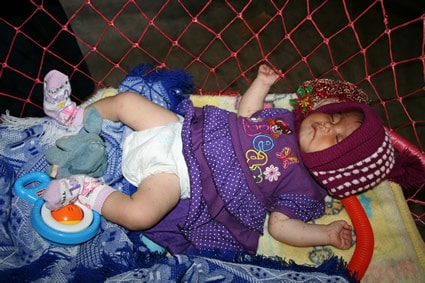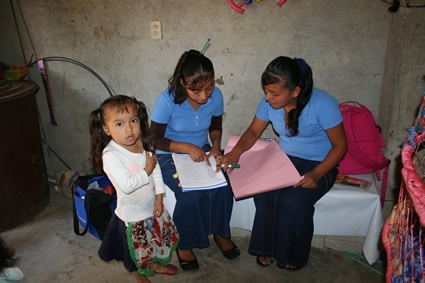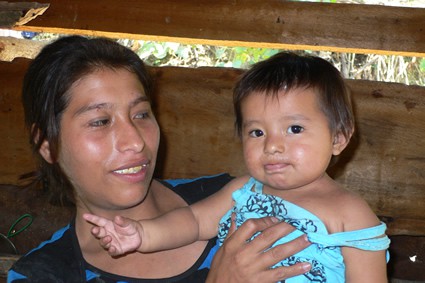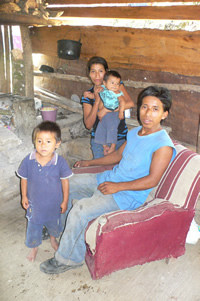Tere lives in a 13-by-13-square-foot cement home with thin layers of cardboard for a roof. She lives there with her three daughters while her husband, a mason, works doing construction in Mexico City.
He sends home about U.S.$50 every two weeks and the money needs to last until the next time he comes home or until she receives money from him again.
Tere was pregnant when she was first invited to be part of the Child Survival Program. Her daughter Perla was born just before this program started in Mexico.

Although Perla is only 4 months old, she is experiencing her mother’s love and the care of this team actively involved in her development.
On home visits, Child Survival Program staff members talk to Tere about her baby’s different needs and help her identify reasons why her baby cries.

They have also talked to her about the importance of showing the baby that she is loved by holding and massaging her, singing to her, using different tones of voice, playing simple games, and rocking her.
Before they pray and bring their time with Tere to an end, the young mother shares,
“Your visits are very helpful. Since you started coming, Perla has started to play with those around her, including her sisters. Now, she giggles or smiles when she is spoken to, and it’s clear that she is happy.”
Florencia is another mom in the Child Survival Program. She is 19 and has two children, a boy and a girl.

On the day our staff is scheduled to visit, Florencia’s husband decides to stay home to see how the meeting goes.

Normally, he is out in the fields gathering wood to sell, but today, he decides to work at home and meet our staff.
Florencia begins her day at 6 a.m. by starting the fire to heat some water for coffee. She then walks to the mill and makes fresh tortillas for her family, including for her husband’s lunch.
Before the Child Survival Program started she didn’t know how to write her name, but now she is working on a few letters from the alphabet.
Since she completed only the first year of elementary school, part of our visit is dedicated to literacy.
The final visit our staff has this day is not a pleasant one.
We follow up on a mother whose baby died. This mother was registered when she was pregnant, but unfortunately, only a couple of months after the program started in Mexico, she suffered from preeclampsia and her baby girl died at birth.
As hard as this loss is to this mother, and as much as the Child Survival Program workers wanted to help, we unable to save this life.
All there is to do now is provide support and comfort to this hurting mother.
For our staff, there are no words to express adequately the feelings of impotence and rage against the consequences of poverty.
Still, the Child Survival Program is oriented to protect children in one of the most vulnerable stages of life. Mothers and families in Mexico urgently need this program.
And now that the Child Survival Program is a reality in Mexico, things have started to change. Today, Mexico rejoices to have this program, but everyone is also very aware of the difficult situations mothers and young children face as they struggle to survive.
In remembrance of this baby who died, we will continue to rescue many more little ones from the deadly trap of poverty.







1 Comment |Add a comment
Thank God for CSP! It is such an amazing program that no only helps the mother and registered child but the whole family and neighbours as well.
My heart goes out to the mother who lost her baby and makes me more thankful for each child and mother who survives due to the courageous and diligent work of CSP staff.